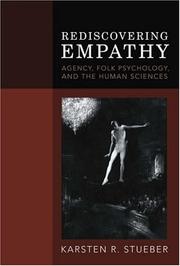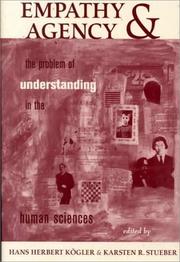| Listing 1 - 4 of 4 |
Sort by
|

ISBN: 026219550X 9780262195508 9780262284530 0262284537 1282097709 9781282097704 0262264781 9786612097706 1429416165 Year: 2006 Publisher: Cambridge, Mass. : MIT Press,
Abstract | Keywords | Export | Availability | Bookmark
 Loading...
Loading...Choose an application
- Reference Manager
- EndNote
- RefWorks (Direct export to RefWorks)
Empathy as epistemically central for our folk psychological understanding of other minds; a rehabilitation of the empathy thesis in light of contemporary philosophy of mind.
Psychology --- Science and psychology. --- Empathy. --- Psychologie --- Sciences et psychologie --- Empathie --- Philosophy. --- Philosophie --- Empathy --- Science and psychology --- Psychology and science --- Philosophy --- Attitude (Psychology) --- Caring --- Emotions --- Social psychology --- Sympathy --- PHILOSOPHY/General --- COGNITIVE SCIENCES/Psychology/Cognitive Psychology --- Empathie. --- Psychologie et philosophie.
Multi
ISBN: 9781107089617 9781316105672 9781107461307 Year: 2017 Publisher: Cambridge Cambridge University Press
Abstract | Keywords | Export | Availability | Bookmark
 Loading...
Loading...Choose an application
- Reference Manager
- EndNote
- RefWorks (Direct export to RefWorks)
Book
ISBN: 110868727X 1108340342 1108340687 1108585329 1108637426 1316105679 1108666957 1107089611 1107461308 Year: 2017 Publisher: Cambridge : Cambridge University Press,
Abstract | Keywords | Export | Availability | Bookmark
 Loading...
Loading...Choose an application
- Reference Manager
- EndNote
- RefWorks (Direct export to RefWorks)
In recent years there has been a tremendous resurgence of interest in ethical sentimentalism, a moral theory first articulated during the Scottish Enlightenment. Ethical Sentimentalism promises a conception of morality that is grounded in a realistic account of human psychology, which, correspondingly, acknowledges the central place of emotion in our moral lives. However, this promise has encountered its share of philosophical difficulties. Chief among them is the question of how to square the limited scope of human motivation and psychological mechanism - so easily influenced by personal, social, and cultural circumstance - with the seeming universal scope and objective nature of moral judgment. The essays in this volume provide a comprehensive evaluation of the sentimentalist project with a particular eye to this difficulty. Each essay offers critical clarification, innovative answers to central challenges, and new directions for ethical sentimentalism in general.
Ethics. --- Deontology --- Ethics, Primitive --- Ethology --- Moral philosophy --- Morality --- Morals --- Philosophy, Moral --- Science, Moral --- Philosophy --- Values --- Sentimentalism. --- Emotivism. --- Emotive theory of ethics --- Ethics, Emotive theory of --- Ethics --- Sentimentality --- Emotions

ISBN: 0429980469 1429486511 9780786743445 0786743441 9780429980466 0813391202 9780813391205 0813391199 9780813391199 Year: 2000 Publisher: Boulder, Colo. Westview Press
Abstract | Keywords | Export | Availability | Bookmark
 Loading...
Loading...Choose an application
- Reference Manager
- EndNote
- RefWorks (Direct export to RefWorks)
How do we, as interpreters and theorists in the human and social sciences, understand agency? What are the methods, models, and mediating theoretical frameworks that allow us to give a reliable and adequate account of beliefs, actions, and cultural practices? More specifically, how can we as interpretive analysts employ our own cognitive capacities so as to render the beliefs, intentions, and actions of other human beings intelligible? These are the leading questions that a group of well-established social philosophers explore in this volume in light of the most recent (and hotly debated) find
Psychology --- Science and psychology. --- Empathy. --- Philosophy.
| Listing 1 - 4 of 4 |
Sort by
|

 Search
Search Feedback
Feedback About UniCat
About UniCat  Help
Help News
News